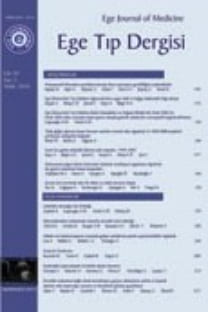Manisa Doğumevinde doğum yapan kadınların doğurganlık öyküleri, aile planlaması davranışı ve doğum sonrası aile planlaması danışmanlığı
Reproductive history, family planning behaviour and postpartum counseling of the women who had delivery in Manisa Maternity and Childcare Hospital
___
- 1) Sağlık Bakanlığı Ana Çocuk Sağlığı ve Aile Planlaması Genel Müdürlüğü. Aile Planlamasında Temel Bilgiler. İnsan Kaynağını Gelistirme Vakfı, İstanbul 1997.sf 1-15.
- 2) Taskın L. (2003). Aile Planlaması, Doğum ve Kadın Sağlığı Hemsireliği, VI. Baskı, Sistem Ofset Matbaacılık, Ankara, s:429- 449.
- 3) Casterline JB, Sinding SW. Unmet need for family planning in developing countries, and implications for population policy. Population and Development Review. December 2000, 26(4):691-723.
- 4) The Johns Hopkins University. Why Family Planning Matters. Population Reports. 1999; 27 (2): 1-16.
- 5) UNICEF. Türkiye'de Ana ve Çocukların Durum Analizi. Ankara 1996. s 119-39.
- 6) Özvarıs SB. Sağlık Eğitimi ve Sağlığı Gelistirme. Hacettepe Halk Sağlığı Vakfı. Ankara 2001. s-56.
- 7) TC Sağlık Bakanlığı Temel Sağlık Hizmetleri Genel Müdürlüğü. Sağlık Hizmetlerinin Yürütülmesi Hakkında Yönerge. Ankara- 2001. s 34-71.
- 8) MANİSA NÜFUS VE SAĞLIK ARASTIRMASI 1999 (Manisa Kent Merkezinde Sağlık Konusunda Durum Saptama Arastırması) Celal Bayar Üniversitesi Tıp Fakültesi Halk Sağlığı Anabilim Dalı, Subat 2001
- 9) Türkiye Nüfus ve Sağlık Arastırması 2003 , Hacettepe Üniversitesi Nüfus Etüdleri Enstitüsü, 2003.
- 10) World Health Organization. Postpartum care of the mother and newborn: a practical guide. Geneva 1998. pp 3-34.
- 11) Naçar M, Öztürk A, Öztürk Y. Doğum sonrasında verilen aile planlaması eğitiminin yöntem kullanmaya etkisi. Erciyes Tıp Dergisi 25 (3) 122-130, 2003
- 12) Hiller JE, Griffith E. Education for contraceptive use by women after childbirth. Cochrane Database Syst Rev 2000; 2: 1-3.
- 13) Bolam A, Manandhar DS, Shrestha P et al. The effects of postnatal health education for mothers on infant care and family planning practices in Nepal: a randomized controlled trial. BMJ 1998; 316: 805-811.
- 14) Little P, Griffin S, Dickson N et al. Unwanted pregnancy and contraceptive knowledge: identifying vulnerable groups from a randomized controlled trial of educational interventions. Fam Pract 2000; 18: 449-453.
- 15) Miller VL, Laken MA, Ager J et al. Contraceptive decision making among Medicaid-eligible women. J Community Health 2000; 25: 473-480.
- 16) Girgin M.Ö, Göktan M, Çorakçı A ve ark. Postpartum dönemde kontrasepsiyon tutumu ve etkileyen faktörler. I. Ulusal Aile Planlaması Kongre Kitabı. Ankara 1999, s 32.
- ISSN: 1016-9113
- Yayın Aralığı: Yılda 4 Sayı
- Başlangıç: 1962
- Yayıncı: Ersin HACIOĞLU
Mediastinal ostesarkom metastazı
Banu AKTİN, U. ÇAĞIRICI, A. ÇAKAN, A. VERAL
Kutsal TURHAN, B. YOLDAŞ, Ö SAMANCILAR, A. ÇAKAN, U. ÇAĞIRICI
The cause of persistent fever in a case of meningoencephalitis: İnfected splenic cyst
Ayşe Fahriye TOSUN, A. AYDOĞDU, K. ELİAÇIK, E. ÇEÇEN, K. KÖSEOĞLU
Büket KOSOVA, Z. EROĞLU, B. YILMAZ, C. GÜNDÜZ, R. ÖZEL, E. SAYIN, Ö. ÇOĞULU, F. ÖZKINAY, C. ÖZKINAY, N. TOPÇUOĞLU
Ewing sarkomunda prognoz klinik ve histolojik bulgular ile belirlenebilir mi?
Wolfram sendromu tanısı alan iki kardeş olgunun retrospektif incelemesi
Mehmet DAVUTOĞLU, H. KARABİBER, E. GÜLER, D. ÇITIRIK, A. ÖZBEK
Erken cerrahi tedaviden fayda gören bir Sturge - Weber sendromu olgusu
Aycan ÜNALP, N. URAN, Y. ERŞAHİN
Annelerin sünnet hakkındaki davranış ve bilgi düzeylerinin incelenmesi
Y. YILMAZ, S.A. ÖZSOY, Melek ARDAHAN
Succesfull thyroid cancer surgery in Glanzmann's disease: Report of a case
